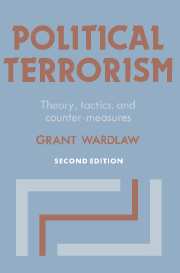Book contents
- Frontmatter
- Contents
- Preface to the second edition
- Preface to the first edition
- Part One An introduction to political terrorism
- Part Two Some selected problems in the response to terrorism
- 8 Counter-terrorist policies: fundamental choices
- 9 Terrorism and the media: a symbiotic relationship?
- 10 The role of the army in counter-terrorist operations
- 11 The legal regulation of terrorism: international and national measures
- 12 Counter-measures against terrorism: the intelligence function
- 13 Terrorist hostage-takings
- 14 Counter-measures against terrorism: the role of behavioural science research
- 15 State involvement in international terrorism
- 16 The future of political terrorism
- Notes
- Select bibliography
- Index
14 - Counter-measures against terrorism: the role of behavioural science research
Published online by Cambridge University Press: 05 January 2012
- Frontmatter
- Contents
- Preface to the second edition
- Preface to the first edition
- Part One An introduction to political terrorism
- Part Two Some selected problems in the response to terrorism
- 8 Counter-terrorist policies: fundamental choices
- 9 Terrorism and the media: a symbiotic relationship?
- 10 The role of the army in counter-terrorist operations
- 11 The legal regulation of terrorism: international and national measures
- 12 Counter-measures against terrorism: the intelligence function
- 13 Terrorist hostage-takings
- 14 Counter-measures against terrorism: the role of behavioural science research
- 15 State involvement in international terrorism
- 16 The future of political terrorism
- Notes
- Select bibliography
- Index
Summary
In Part One of this book it was shown that terrorism as a tactic is not a novel phenomenon. Yet presently we stand in danger of being engulfed by a flood of books, films, magazine and journal articles, conferences and symposia all devoted to defining, describing, understanding, or countering the ‘threat of modern terrorism’. This flurry of activity suggests that we do not understand exactly what is the nature of the threat which is forcing many nations to devote to it more and more of their time and resources. In the first place, little consideration seems to have been given to the question of whether or not a ‘real’ threat exists or whether it may in some instances be essentially a product of fear and prejudice. Is it possible that many official reactions to terrorism reflect an unwillingness or inability to grapple with the inequalities in society or are a smokescreen designed to disguise repressive measures taken for unrelated political reasons?
It might be suggested that here is an important focus for behavioural science research. This is not the sort of research which will find favour with governments and security officials. For the former it may represent a dangerous challenge to their legitimacy and for the latter it offers nothing ‘practical’ in the way of the specific security measures they seek.
- Type
- Chapter
- Information
- Political TerrorismTheory, Tactics and Counter-Measures, pp. 161 - 174Publisher: Cambridge University PressPrint publication year: 1989



